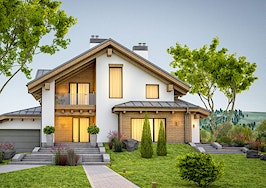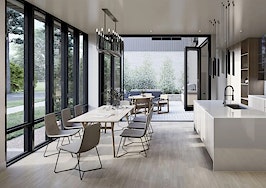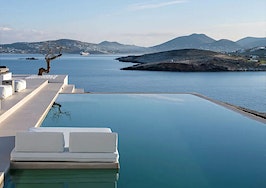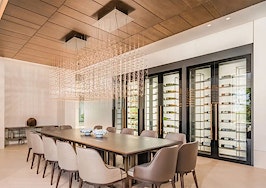Join the exceptional and become a Sotheby's International Realty agent.
Learn More
For luxury homebuyers, energy-efficient features are an appealing add-on. Buyers are on the lookout for high-quality, modern systems that will save them money and shrink their environmental impact for years to come. The question for luxury agents is: which ones should sellers implement as a way to successfully market their properties?

Tadashi Shiga
“Luxury buyers are looking for benefits that go hand in hand with energy efficiency,” says Tadashi Shiga, Executive Director of the Land Division at Realogics Sotheby’s International Realty. “They want a premium indoor environment that accommodates things like enhanced comfort, indoor health and air quality, and the convenience of automation. We also often see clients buying with their values, with the desire for a lower carbon footprint top among the list.”
Here, three agents list the energy-efficient features their buyers are requesting most often.
Popular features
1. Solar panels

Mino McLean
When the climate conditions and physical placement are correct, photovoltaic (PV) systems are popular among luxury real estate buyers. Mino McLean, REALTOR®-Broker with Island Sotheby’s International Realty, notes that power is more expensive in her market of Maui than anywhere else in the country.
Since many solar power net-metering programs have been curtailed, energy storage systems have become sought after. “The current exciting trend is the installation of battery storage and back-up power,” says McLean. “While not the only option, the Tesla Powerwall leads the pack and with its slick design and a solid performance record. The affordability and reliability of energy storage systems have reinvigorated the PV market, and my clientele is largely eco-conscious, which makes for good synergy.”
2. LED lighting

Tracy Koorbusch
“LED lighting is also a given for energy-conscious buyers,” observes Tracey Koorbusch, Senior Global Real Estate Advisor at Sotheby’s International Realty in Greenwich, Connecticut.
“The newest generation of LED lighting is truly making a difference, and a well-designed lighting plan adds energy efficiency and a level of style that buyers want,” agrees Shiga.
For McLean, this isn’t just attractive to buyers, but a tactical value-add for sellers. “In our market, sellers are required to disclose their energy costs for the past quarter to potential buyers, so I encourage them to upgrade their lighting to LED,” she says.
3. Electric vehicle chargers
Eco-conscious clientele are likely to have electric vehicles (EVs) and will be looking for homes with charging stations that can power them. “Buyers are willing to pay substantially more for homes with PV systems, electric car plug-ins, and battery back-up, as these features can reduce long-term costs significantly,” says McLean. “With an electric car, homeowners can charge their vehicles while at home, powered by the sun, at a very low cost.”
Even outside sun-soaked markets such as Maui, an EV charging station is an affordable energy-efficient option to add to a listing. “It’s a lower cost improvement with buyer appeal,” says Shiga.
4. Smart home technology
“Hands down, buyers are the most excited about smart home technology because it really gives them the best of both worlds: they can optimize their energy use and enjoy convenience and comfort,” says Shiga. “Knowing that a home can be controlled by phone or that a system can learn and adapt to the client’s lifestyle is truly a game-changer. Smart home technology can also prove especially helpful in second-home markets, which will allow homeowners to adjust away times and monitor systems from afar.”
Many elements come together to create a complete smart home solution, and Koorbusch notes that it’s not necessary to implement them all at once. “The investment can start small with individual products that work together, or a single user interface that can add components as needed. Popular systems include the relatively inexpensive Google Nest or the more sophisticated Lutron or Control4.”
5. Modern HVAC
Koorbusch says that in her luxury Connecticut market, where the average sales price is over $2 million, buyers automatically expect features such as LED lighting and high Energy Star-rated appliances — but they’re also focused on more subtle functionality from things like double-paned windows and programmable thermostats.
These are part of the home’s holistic heating, ventilation, and air conditioning (HVAC) systems, and buyers place a high value on energy efficiency. “A substantial percentage of the energy used in the home is from heating and cooling, and geothermal systems that harness the forces within the earth to produce energy are starting to replace traditional fossil fuel burning furnaces or boilers,” says Koorbusch.
Take stock of the competition
“Whether to update energy-efficient features depends on the house and the marketplace: if the systems do not match the competition in terms of price and comfort, that can be a signal to look at updates,” says Shiga.
While listings must be competitive in the market, there are limits to how much sellers should invest. “I would not recommend making costly upgrades to make a home more energy-efficient at the time of sale,” says McLean. “I think it makes more sense to price the property correctly and allow the new homeowner to make those improvements and to tailor those improvements to their specific energy needs.”
Koorbusch agrees, especially in terms of large-scale implementations such as energy-efficient appliances, complete smart home installations, and HVAC systems. “The cost savings are generally realized over a period of time,” she says. “Upgrading to the latest and greatest energy-efficient products may not be the best return on investment if you are selling immediately.”
At the end of the day, luxury agents need to help their sellers appeal to buyers while ensuring they don’t overspend on a property they’re preparing to leave. By striking this balance, you can make the most of energy-efficient features to drive demand for your listings and delight clients on both sides of the deal.
About Sotheby’s International Realty
Sotheby’s International Realty was founded in 1976 as a real estate service for discerning clients of Sotheby’s auction house. Today, the company’s global footprint spans 990 offices located in 72 countries and territories worldwide, including 43 company-owned brokerage offices in key metropolitan and resort markets. In February 2004, Realogy entered into a long-term strategic alliance with Sotheby’s, the operator of the auction house. The agreement provided for the licensing of the Sotheby’s International Realty name and the development of a franchise system. The franchise system is comprised of an affiliate network, where each office is independently owned and operated. Sotheby’s International Realty supports its affiliates and agents with a host of operational, marketing, recruiting, educational and business development resources. Affiliates and agents also benefit from an association with the venerable Sotheby’s auction house, established in 1744. For more information, visit www.sothebysrealty.com.
The affiliate network is operated by Sotheby’s International Realty Affiliates LLC, and the company owned brokerages are operated by Sotheby’s International Realty, Inc. Both entities are subsidiaries of Realogy Holdings Corp. (NYSE: RLGY) a global leader in real estate franchising and provider of real estate brokerage, relocation and settlement services. Sotheby’s International Realty Affiliates LLC and Sotheby’s International Realty Inc., both fully support the principles of the Fair Housing Act and the Equal Opportunity Act.









